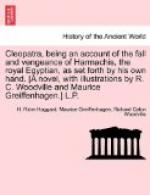And I saw this: a face shrunken and pallid, on which no smile came; great eyes grown wan with gazing into darkness looking out beneath the shaven head, emptily, as the hollow eye-pits of a skull; a wizened halting form wasted by abstinence, sorrow, and prayer; a long wild beard of iron grey; thin blue-veined hands that ever trembled like a leaf; bowed shoulders and lessened limbs. Time and grief had done their work indeed; scarce could I think myself the same as when, the royal Harmachis—in all the splendour of my strength and youthful beauty—I first had looked upon the woman’s loveliness that did destroy me. And yet within me burned the same fire as of yore; yet I was not changed, for time and grief have no power to alter the immortal spirit of man. Seasons may come and go; Hope, like a bird, may fly away; Passion may break its wings against the iron bars of Fate; Illusions may crumble as the cloudy towers of sunset flame; Faith, as running water, may slip from beneath our feet; Solitude may stretch itself around us like the measureless desert sand; Old Age may creep as the gathering night over our bowed heads grown hoary in their shame—yea, bound to Fortune’s wheel, we may taste of every turn of chance—now rule as Kings, now serve as Slaves; now love, now hate; now prosper, and now perish. But still, through all, we are the same; for this is the marvel of Identity.
And as I sat and thought these things in bitterness of heart, there came a knocking at the door.
“Open, Atoua!” I said.
She rose and did my bidding; and a woman entered, clad in Grecian robes. It was Charmion, still beautiful as of old, but sad faced now and very sweet to see, with a patient fire slumbering in her downcast eyes.
She entered unattended; and, speaking no word, the old wife pointed to where I sat, and went.
“Old man,” she said, addressing me, “lead me to the learned Olympus. I come upon the Queen’s business.”
I rose, and, lifting my head, looked upon her.
She gazed, and gave a little cry.
“Surely,” she whispered, glancing round, “surely thou art not that——” And she paused.
“That Harmachis whom once thy foolish heart did love, O Charmion? Yes, I am he and what thou seest, most fair lady. Yet is Harmachis dead whom thou didst love; but Olympus, the skilled Egyptian, waits upon thy words!”
“Cease!” she said, “and of the past but one word, and then—why, let it lie. Not well, with all thy wisdom, canst thou know a true woman’s heart, if thou dost believe, Harmachis, that it can change with the changes of the outer form, for then assuredly could no love follow its beloved to that last place of change—the Grave. Know thou, learned Physician, I am of that sort who, loving once, love always, and being not beloved again, go virgin to the death.”




